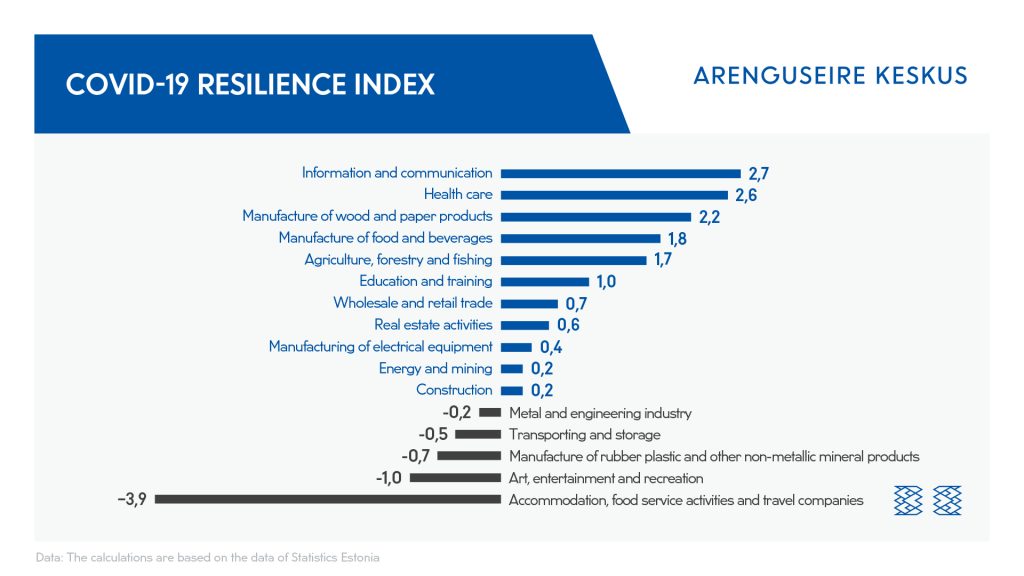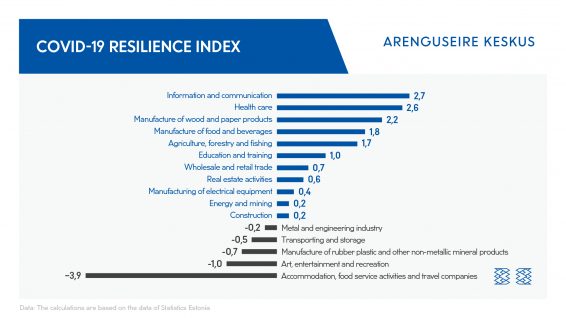The corona crisis discourages green transition in trade
The corona crisis discourages green transition in the trade because greater attention to hygiene increases the use of packages, and investments into environmental sustainability have been stopped due to the crisis, says the Foresight Centre report “The Impact of the Virus Crisis on the Estonian Economy. Scenarios up to 2030”. The virus crisis has boosted e-commerce in Estonia, but it has not replaced the turnover of traditional shops.

“The virus crisis has had a strong impact on the normal functioning of commerce,” Expert of the Foresight Centre Uku Varblane said. “Part of the trade sector has managed to mitigate the negative effect of the crisis through rapid reorientation to e-channels and contactless solutions, but the increased e-commerce still does not cover the reduced turnover of traditional shops.”
Varblane believes that long virus crisis may result in the consolidation of the trade market and decrease of competition because smaller enterprises will terminate their activities. “The rise of e-commerce opens the trade-in Estonia to global competition because local companies will have to compete more with large global e-shops,” Varblane said. “Lasting change in consumer habits and shift towards e-commerce will create new opportunities for businesses, but will also require new skills, like data analysis and digital marketing, to stay in the competition.”
Uku Varblane thinks that the virus crisis has caused a setback for the green transition in trade for some time. “When in recent years there has been a strong trend to reduce packaging, then greater attention to hygiene that emerged with the virus crisis has led to a setback in this regard, and e-commerce as such uses more packaging than ordinary trade. Also, the projects connected with improving energy efficiency have been put on hold in commerce as nobody wishes to take excessive risks in complicated times,” he added.
Varblane also said that in order to meet the expectations of consumers, emphasising environmental sustainability was still important for commercial enterprises because the younger generation was increasingly aware of environmental impacts. “Sustainability has to be kept in mind in building up supply chains, in choosing of brands as well as in the packaging of products,” Varblane explained.
In 2019, the wholesale and retail sector in Estonia employed 18.3% of the labour force or 101,000 people. The sector provided 13.5% of the added value of the Estonian economy or 3.3 billion euro.
From March to October last year, the monthly turnover of wholesale companies decreased by 10.4% in comparison to the year before; in retail trade, the total turnover reached the level of the previous year thanks to the good results in summer months.
According to the COVID-19 resilience index developed by the Foresight Centre, the wholesale and retail trade ranked seventh (with 0.67 points) by resilience to the crisis among the 17 economic sectors studied.
The Foresight Centre report “The Impact of the Virus Crisis on the Estonian Economy. Scenarios up to 2030” is available here.
COVID-19 resilience index
The COVID-19 resilience index measures the extent to which economic sectors are affected by the coronavirus crisis. The index is based on various economic indicators of companies. The value of the index is between -5 (the largest negative impact) and +5 (the smallest negative impact). The index takes into account the changes in the turnover of companies (total turnover in March–August 2020 compared with the same period the year before) in the economic sector, changes in their number of employees in comparison to 2019 and the dynamics after the emergency situation, changes in labour expenses, and changes in the profit and investments of companies in comparison to the same period last year.

BACKGROUND
The calculations and figures of the surveys use the data of Statistics Estonia. The descriptions of development perspectives are based on the interviews with the representatives of sectoral associations and the focus group interviews conducted in cooperation with the research group of the Estonian Qualifications Authority OSKA.
The Foresight Centre is a think tank at the Chancellery of the Riigikogu that analyses long-term developments in society and economy. The Centre conducts research projects to analyse the long-term developments in Estonian society and to identify new trends and development directions.
Latest news
-
16.01 2026Study: The transition to Estonian-language-based education has led Russian families to use the help of private tutors
Hiring private tutors is widespread in Estonia. According to the study by the Foresight Centre, “The Use of Private Tutors in Estonia”, the need for private tutoring is greatest in Russian-speaking families, where private tutors are hired more than twice as often as in Estonian-speaking families.

 An independent think tank at the Riigikogu
An independent think tank at the Riigikogu 